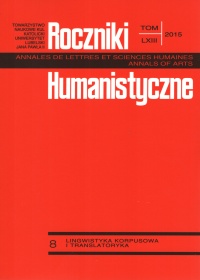An Analogical Theory of the Meaning of Linguistic Terms: Elements of the Metaphysics of Language
Abstract
In realist philosophy, analogy is a basic way of knowing the wealth of the world of persons and things as well as protects human knowledge against reductionism. Analogical knowledge is grounded on the analogical way beings exist, that is, is genetically and structurally combined with things. Analogy allows to cognitively encompass both particular things and the whole of the world of nature and culture, while saving the plurality of beings composing it. A theory of the meaning of linguistic terms, built on analogy, yields a basis for apprehending the deepest structure of a thing in the meaning of a given name, since it points to the necessary internal organization of the content of a denoted thing, which decides for the name that it properly and adequately understands a denoted thing.
References
Krąpiec M.A., 1995, Realizm ludzkiego poznania. Dzieła II, Lublin.
Krąpiec M.A., 2005, «Analogia w filozofii», [in:] Analogia w filozofii. Zadania współczesnej metafizyki 7, [red.] A. Maryniarczyk, K. Stępień, P. Skrzydlewski, Lublin.
Locke J.,1955, Rozważania dotyczące rozumu ludzkiego, tłum J. B. Gawecki, Warszawa.
Marciszewski W., 1977, Metody analizy tekstu naukowego, Warszawa.
Copyright (c) 2015 Roczniki Humanistyczne

This work is licensed under a Creative Commons Attribution-NonCommercial-NoDerivatives 4.0 International License.





